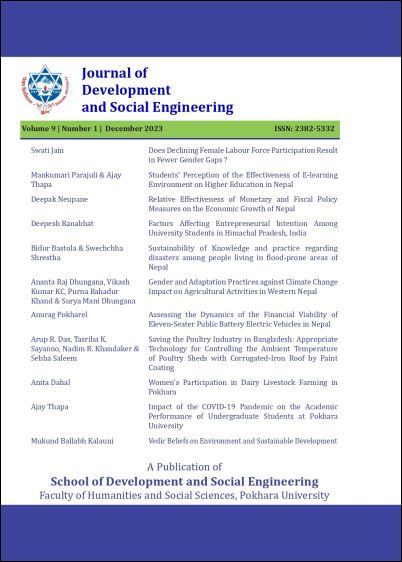Assessing the Dynamics of the Financial Viability of Eleven-Seater Public Battery Electric Vehicles in Nepal
DOI:
https://doi.org/10.3126/jdse.v9i01.70608Keywords:
Public battery electric vehicles, Total cost of ownership, Sensitivity analysis, Assessment frameworkAbstract
Public electric vehicles have been identified to make notable contributions to sustainable development and climate change mitigation among other goals. In Nepal, public battery electric vehicles (BEV) are becoming mainstream in certain segments of the market. With that, there are also several systemic challenges that could halt this momentum. This calls for understanding their viability and how they are impacted by interactions and interdependencies between various components of the public BEV ecosystem and the environment around it. The purpose of this study is to conduct a total cost of ownership (TCO) analysis of public BEVs in Nepal and assess sensitivities resulting from the interlinkages and changes in key factors.
The study prepared a financial model for a TCO estimation of an intercity public electric microbus (EMB) model in Nepal and compared it with a diesel microbus (DMB). Guided by a system thinking framework, sensitivity analyses were done to provide broad insights into financial viability.
The TCO of the EMB was found to be lower than that of its diesel counterparts. That said, the sensitivity analyses show that there are several factors that could affect the financial viability of public EMBs. Overall, it was seen that the EMBs are more resilient to change than the diesel variants. Financial viability is one of the key factors for vehicle adoption by businesses. Policymakers and practitioners can use systemic perspectives to have a well-rounded approach to supporting BEVs’ growth. The proposed framework aims to help gather such perspectives.
Downloads
Downloads
Published
How to Cite
Issue
Section
License
Copyright © Journal of Development and Social Engineering, School of Development and Social Engineering, Faculty of Humanities and Social Sciences, Pokhara University. All rights reserved. The School of Development and Social Engineering, Pokhara University holds the exclusive copyright of all the contents of this journal. No part of this journal may be reproduced or transmitted by any media or publishing organizations including websites without the written permission of the copyright holder. The contents of this journal are available for any citation, using a recognized and proper referencing system.




